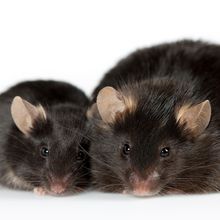Login
Subscribecervical cancer

Why Some HPV Infections Carry More Cervical Cancer Risk
Dan Robitzski | Feb 2, 2023 | 5 min read
Where and how human papillomavirus integrates itself into the human genome steers the infection’s clinical outcomes, finds a large, multifaceted study.

Obesity Protects Against Genital Herpes in Mice, Study Finds
Katherine Irving | Nov 11, 2022 | 3 min read
A high-fat diet induced changes to the animals’ vaginal microbiomes that boosted survival after exposure to the virus.

Harboring Hard and Soft Cells Lets Tumors Grow and Metastasize Simultaneously
Katherine Irving | Oct 17, 2022 | 4 min read
Islands of rigid cells within a matrix of soft ones allow tumors to be both solid and fluid, granting them toughness without losing the ability to break apart.

DNA Methylation Could Predict Ovarian, Breast Cancers
Anna Napolitano, PhD | Feb 11, 2022 | 5 min read
A pair of new studies finds that analyzing material from a Pap smear can reveal tumor risk in distant parts of the body, potentially allowing early interventions.

Virologist Keerti Shah Dies
Catherine Offord | Aug 2, 2019 | 3 min read
The Johns Hopkins University researcher’s work helped solidify the link between human papillomavirus and cervical cancer, leading to the approval of the HPV vaccine in 2006.

Taller People More Prone to Cancer
Abby Olena, PhD | Oct 24, 2018 | 4 min read
The increased risk is slight, but aligns with a longstanding hypothesis that having more cells in one’s body leads to more chances for those cells to become cancerous.

Image of the Day: Henrietta Lacks
The Scientist Staff | May 12, 2018 | 1 min read
A painting of the woman who was the source of HeLa cells will be on view at the National Portrait Gallery beginning May 15.

Genetic Test Could Replace Pap Smear
Kerry Grens | Apr 25, 2014 | 2 min read
The US Food and Drug Administration approves a cervical test for human papillomavirus to be used as a primary cancer screening tool.
Failed vaccine trial raises questions
Jef Akst | Jun 23, 2011 | 2 min read
In contrast to yesterday’s news about the success of an HPV vaccine program in Australia, an Indian trial of the vaccine is stoking unfounded fear among the public and exposing some questionable ethical standards.
HPV vaccine shows promise
Jef Akst | Jun 22, 2011 | 1 min read
An HPV vaccination program in Australia appears to have resulted in a drop in cervical lesions among young women.
